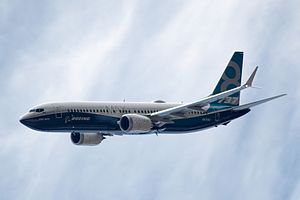737 MAX
| Boeing 737 MAX | |
|---|---|
 |
|
| Boeing 737 MAX during a flight display | |
| Role | Narrow-body twin-engine jet airliner |
| National origin | United States |
| Manufacturer | Boeing Commercial Airplanes |
| First flight | January 29, 2016 |
| Introduction | Q2 2017 (scheduled, with Malindo Air) |
| Status | Certified (MAX 8) |
| Produced | 2014-present |
| Number built | 4 prototypes |
| Unit cost | |
| Developed from | Boeing 737 Next Generation |
The Boeing 737 MAX is an American narrow-body jetliner series being developed by Boeing Commercial Airplanes as the successor to the Boeing 737 Next Generation series. The 737 MAX is the fourth generation of the 737 family, with the primary change being the use of the larger and more efficient CFM International LEAP-1B engines, split-tip winglets, and modifications to the airframe. As of December 31, 2016[update], Boeing has 3,605 firm orders for the 737 MAX series. The 737 MAX 8 first flew on January 29, 2016, nearly 49 years after the maiden flight of the 737 on April 9, 1967. The 737 MAX 8 gained FAA certification on March 9, 2017. First delivery is scheduled in May 2017 to Southwest Airlines, which expects to debut it later in October, after Malindo Air during the second quarter.
In 2006, Boeing started considering the replacement of the 737 with a "clean-sheet" design that could follow the Boeing 787 Dreamliner, but a decision on this replacement was postponed into 2011. In November 2014, it was reported that Boeing intended to replace the 737 by 2030 with a new design, possibly with a composite airframe, internally named Boeing Y1.
In 2010, Boeing's competitor, Airbus, launched the Airbus A320neo with new engines to improve fuel burn and operating efficiency. The decision was met with positive reaction by many airlines and they began ordering large numbers of the aircraft. Pressure from airlines for more fuel efficient aircraft forced Boeing to shelve plans for developing a replacement aircraft, the Boeing Y1, and instead focus on upgrading the 737.
On August 30, 2011, the company's board of directors approved the 737 MAX project. Boeing predicts that the 737 MAX will provide a 16% lower fuel burn than the current Airbus A320, and 4% lower than the Airbus A320neo. Boeing expects the 737 MAX to meet or exceed the range of the Airbus A320neo.
...
Wikipedia
